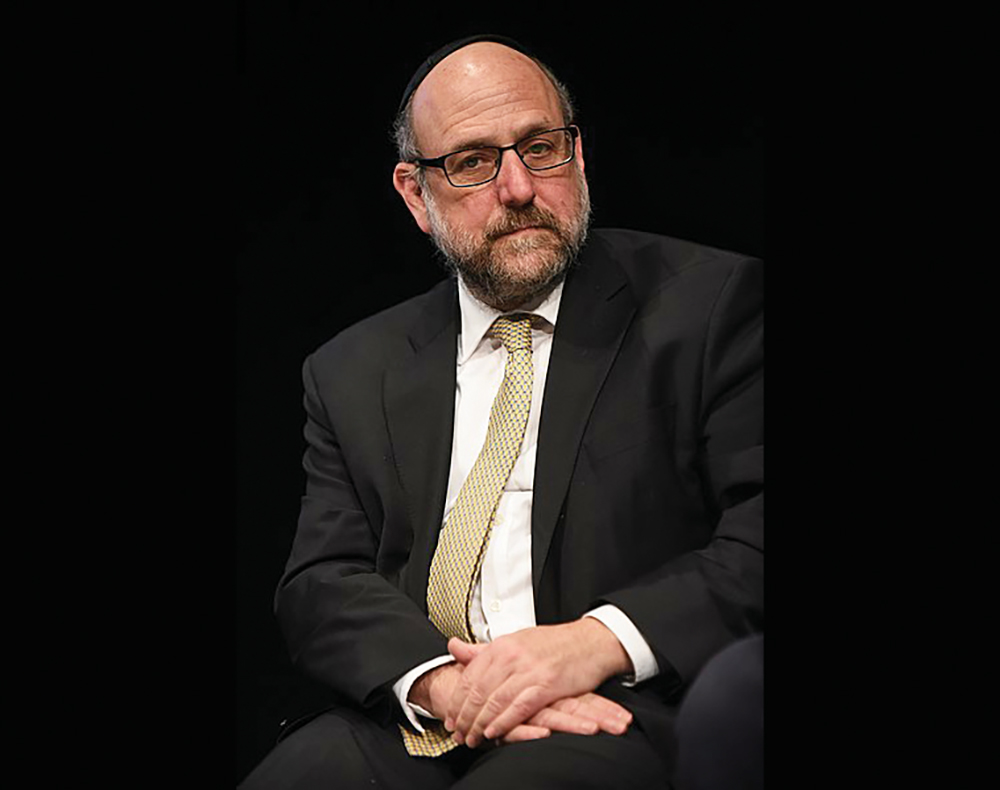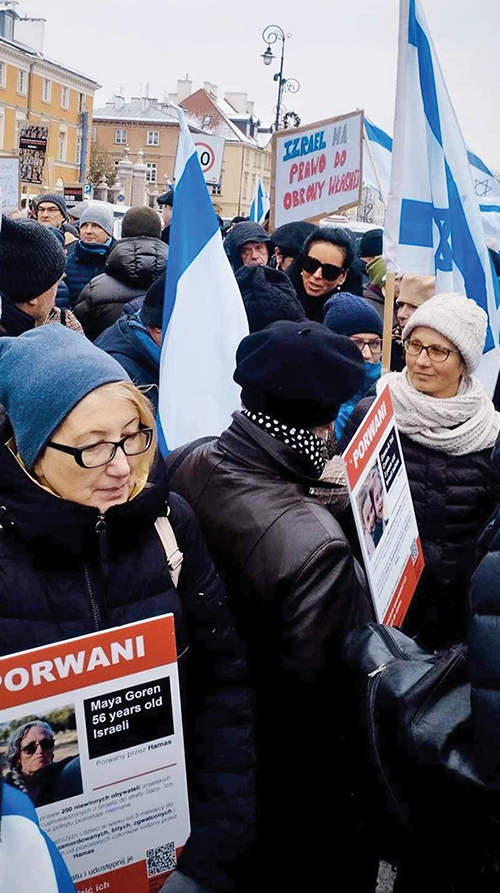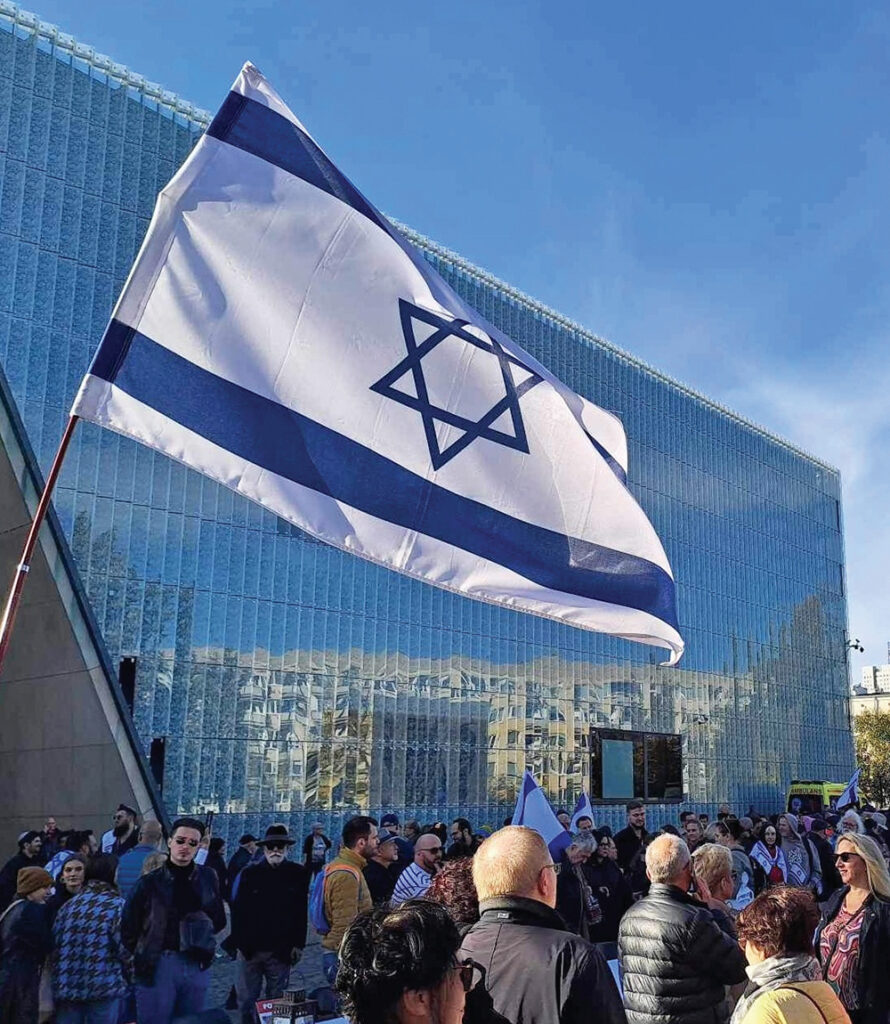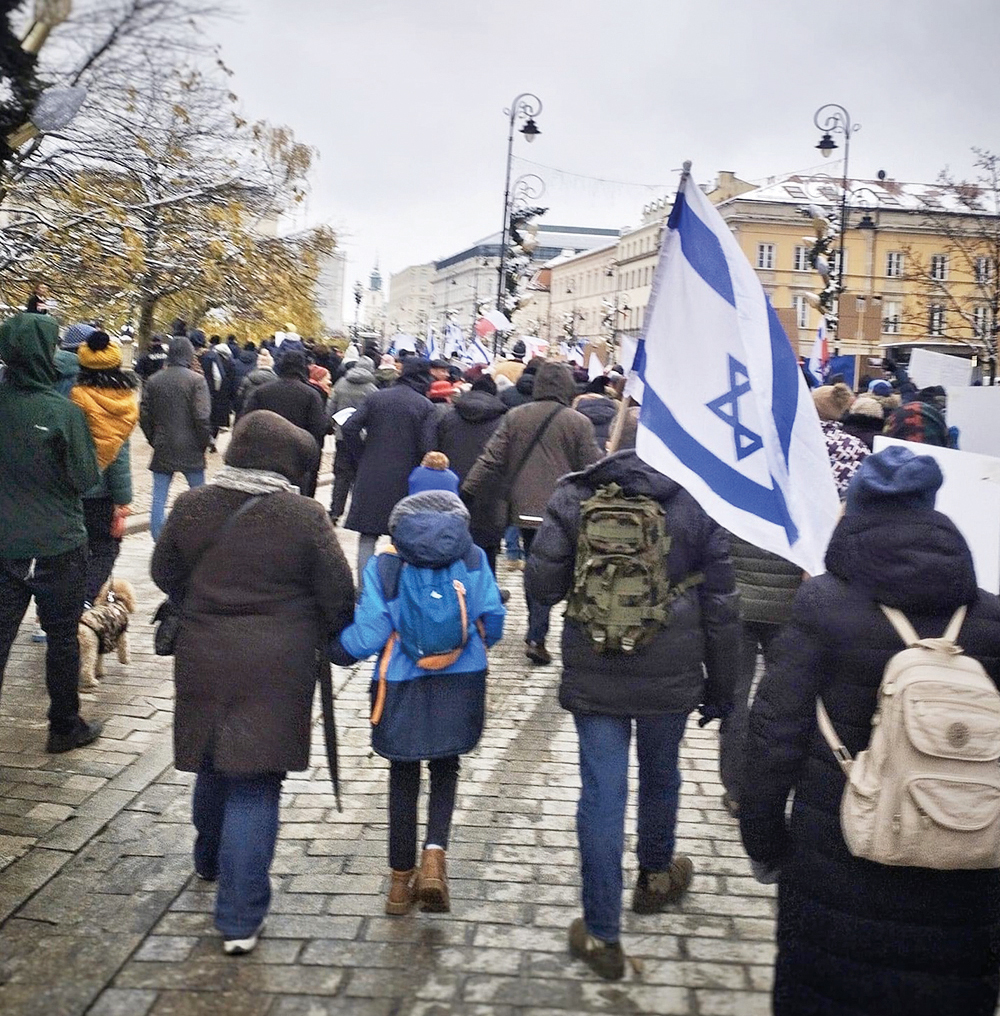
Less than a week after the most heinous terror assault in Israel’s history, Chief Rabbi of Poland Michael Schudrich instituted a public prayer for peace in Warsaw. Rabbi Schudrich presides over the Nozyk Synagogue on Twarda Street in Warsaw. This seminal institution is the only surviving pre-war Jewish house of prayer in the city, as it officially opened to the public in 1902. Damaged by an air raid in September 1939 at the onset of World War II, the building was partially restored and returned to the Warsaw Jewish Commune in the months after the war. It was not completely rebuilt until April 1983, however. “The Jewish community [in Poland] is a small community struggling to reassert its Jewish identity while being responsible for preserving its glorious past,” Rabbi Schudrich told the Jewish News Service (JNS) in 2019.
As a Conservative Jew in New York growing up with three siblings, Rabbi Schudrich studied religion at SUNY Stony Brook on Long Island, before attending the Jewish Theological Seminary (JTS) in Manhattan for rabbinical school. He then earned his master’s in history from Columbia University. His first trip to Poland was as an 18-year-old in the early 1970s. As also reported by JNS, he “returned again and again, joining forces with the Jewish Flying University, where people gathered secretly.” After graduating from JTS, Rabbi Schudrich headed a small congregation in Japan, largely composed of tourists, professionals and post-army-duty Israelis.

It was with the help of Ronald Lauder, the businessman who has been president of the World Jewish Congress for two decades, that brought Rabbi Schudrich to Poland for the long term. “Ronald is the one who got me here,” the rabbi told JNS. “Without him, I don’t know if we could have accomplished a fraction of what we have.” Beginning in 2000, after returning to the U.S. to receive his second rabbinical ordination from the Rabbi Isaac Elchanan Theological Seminary at Yeshiva University, he served as rabbi of Warsaw and Łódź. In 2004, he accepted the job of Poland’s chief rabbi.
Under the Sigismund Column in Warsaw on October 10, 2023, Rabbi Schudrich called upon people “to participate in a shared, public prayer for peace,” which addressed “all people of goodwill.” The event, which was held just a few days after Hamas’ multipronged and deadly terror attack, was attended by many dignitaries, including Israeli Ambassador to Poland Yaakov Livne as well as U.S. Ambassador Mark Brzezinski. Several rabbis throughout the country also attended the gathering among throngs of others. “We can never forgive this barbarism; we will never be silent,” Rabbi Schudrich said, as reported by TVP World. “I lack the words to describe this tragedy. It’s difficult for me to say whether the current situation in Israel can be called a war. Military actions are not just about fighting the army, but affect defenseless civilians. This is not only an assault on Israel but on every Jew around the world. This is an assault on every moral person around the world.”
In an exclusive interview with The Jewish Link, Rabbi Schudrich provides a rare and essential Talmudic guide to better equip and help Jews navigate spiritually and pragmatically through these difficult days and weeks ahead.

Speak to the notions of “light versus darkness” when it comes to Israel’s war with Hamas. Broadly speaking, what are the current existential questions posed now for the Jewish people?
This war is not between Israel and the Arabs or the Palestinians. It is a war between Israel together with the Jewish people against a terrorist group, Hamas, that wants to kill both the State of Israel and all Jews around the world. Simply put: [it’s] a war between good and evil.
As chief rabbi of Poland, what are the crucial aspects you’re seeking to impart to your congregants and to the Jewish Diaspora in light of the devastating terror assault on October 7?
We must be more united than ever. Divisions within our people weaken us. Unity will always strengthen us.
Have the themes of the weekly parshas evolved in recent weeks? From what pieces of Jewish liturgy can Jews gain some degree of comfort and solace?
The parsha always has a special message and lesson for what we are experiencing right now. The Lubavitcher Rebbe often emphasized this. My challenge continues to be finding what the unique special message is for us right now from this week’s parsha.
Take me back to the morning of October 7. What series of ideas have raced through your mind ever since then?
Since October 7, I have been completely focused on what we can do to help: materially, politically and most importantly, spiritually. But all three elements are essential.
What do you consider your role as Chief Rabbi of Poland to be in the wake of these atrocities?

My role is the same as any other Jew or any other moral person. [It’s] to speak the truth in the loudest and most persuasive manner possible. [My role, too, is to] support all those who need my support and to encourage and solace as is needed.
The question of “Never Again” has long been a common refrain since the Shoah. This maxim seems to have fallen to the wayside in light of this heinous terror assault. What must be the new refrain for Jewish institutions and synagogues in particular?
Am Yisrael Chai. Unity is our secret weapon.
Were you heartened by the near 300,000 in attendance at the March for Israel in Washington, D.C. on November 14? There also was a strong presence at a March for Israel in Warsaw. What do you make of each?
The Washington March for Israel was amazing! My daughter, brother, sister-in-law, nephew and cousin were there. We also had an amazing March for Israel here in Warsaw, and we marched through the main street of Warsaw, known as the Fifth Avenue of Warsaw. There were Israeli and Polish flags flying [along with] photos of Israeli hostages. [There was] singing and praying together with one people—Jews and non-Jews together. [We were all] marching for the right of Israel to exist and defend itself, marching for the hostages to “bring them home now,” and marching against antisemitism and hate. [This was] moral people marching together to save the soul of the world.
Would you give a summary of who you personally know in Israel and what they’re doing now? For instance, on your Instagram, you’ve posted a rabbi from Poland who is a reservist. He stressed that Jews “must be one,” regardless of affiliation or political point of view. Will you speak to this notion of “one-ness”?
Most of my extended family live in Israel as I have two cousins who were called back up to the army and are serving in or near Gaza. My wife’s cousin is one of two female navigators for fighter jets. Two rabbis who formerly served in Warsaw were also called up back to the army and are serving in the north. Lots of children and grandchildren of my close friends are back in the army. For many of us, this war is also very personal with family and friends on the front, and some have been wounded and killed.
The rise of antisemitism worldwide since October 7 is a phenomenon impossible to ignore, but in lieu of discussing it in fear of amplifying unnecessary attention to hateful rhetoric and actions, what are the best mechanisms to counter these nefarious elements? Where are these seeds of hate really emanating from and why? What can those who seek “truth and light” best do in order to counter it?
Seeds of antisemitism come from traditional sources, but also people being influenced by lies being told on social media. We need to be much better at getting our message out on social media. However, it is an unfair fight. We write the truth. The terrorists write lies and hate.
As chief rabbi of Poland, how are you mediating various congregations among Israel, U.S. and Poland’s Jews?
It’s always the same goal. It’s to bring Jews and [other faiths] of goodwill closer.
As to combat the scourge of antisemitism, are you worried about the rise of such nationalist groups to exploit this terrible time that’s befallen the Jewish people?
I do not worry as I plan and work to combat all hate.
Do you see parallels with Hamas’s brutal assault on October 7 with the Russian invasion of Ukraine?
The Ukraine war is connected since Russia’s been training Hamas terrorists in Syria. This is not parallel. It is simply connected.
In broad strokes, what do you suggest the emphasis of Jewish Diaspora should be over the next weeks and months?
We need to emphasize that this is not a war between Israel and Palestinians. This is a war to uproot terrorists from Gaza. To accomplish this, we need to be very active in social media and most importantly be together. Unity. One-ness. When we achieve unity, we will succeed, and [ultimately] will work and bring peace to all people of the Middle East.
Jared Feldschreiber, born in New York City, is a freelance reporter and contributor to the Queens Jewish Link, Central European Affairs magazine, The Times of Israel, the Jerusalem Report, UPI, HuffPost, World Policy Journal and the Kyiv Post. He is based in Warsaw, Poland, and often chronicles literary figures, filmmakers and dissidents in nascent democracies. “Reckless Abandon,” his novella, is available worldwide. X (formerlyTwitter): @jmfeldschreiber








